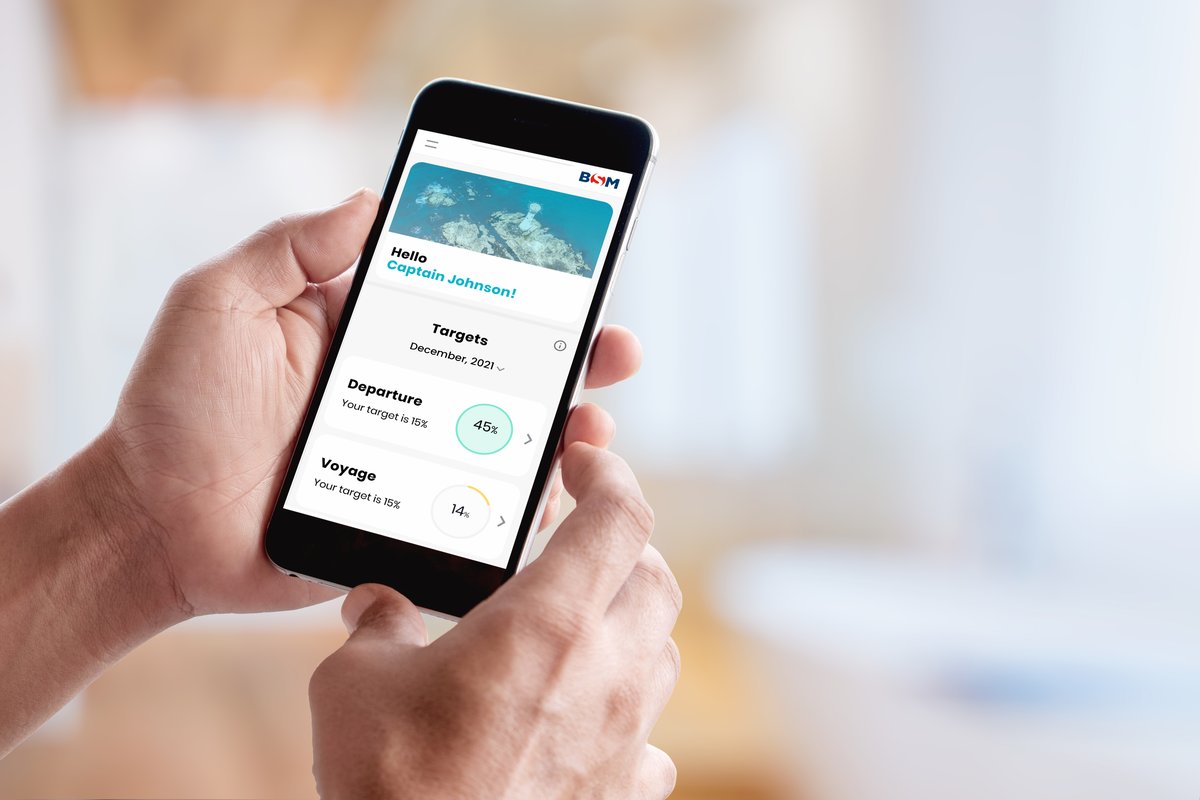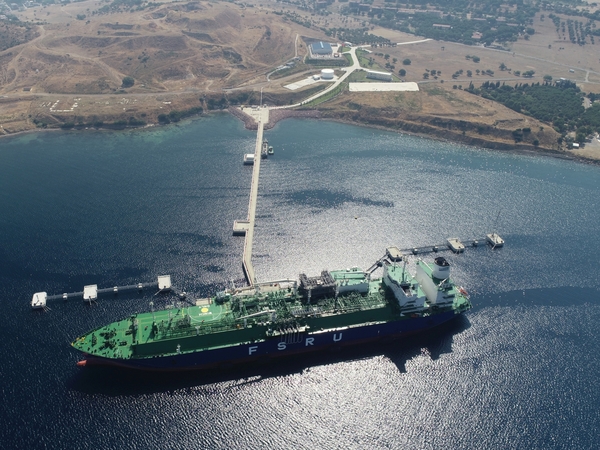
As part of a research and development project, Bernhard Schulte Shipmanagement (BSM) has for the first time investigated the influence of the behavioural change of individual seafarers on carbon emissions on selected ships managed by BSM Deutschland (BSMD). Using clean-tech start-up Signol’s app, which is based on behavioural science best practice, remarkable reductions in bunker fuel consumption were detected on single ships.
Leveraging big data for greener shipping: Teaming up with London-based clean-tech company Signol, BSM studied how individual behavioural change can lead to a reduction in ships’ energy demand and carbon emissions. This is done by combining the analysis of operational data from selected BSMD managed vessels with cutting-edge behavioural science in an app and tailored communications developed by Signol.
During the research project, which ran in the second half of 2021, 60 Masters and Chief Engineers on 28 vessels under full management of BSMD were invited to take part in the trial on a voluntary basis. During this time, each participating crew member received individualised targets via the Signol app which are calculated based on the seafarer’s prior performance. Every week, the participating seafarers received updates on their personal milestones and achievements via the app and email. Through a combination of fair targets and positive feedback, Signol gently nudged individual Masters and Chief Engineers to implement fuel-saving practices.
Seafarers can be nudged to have an impact
The analysis of the pilot tests revealed promising results on single vessels which need to be verified by further tests. The R&D project proved that seafarers can be nudged and become aware of their individual influence on major challenges.
Nick Topham, Managing Director of BSM Deutschland, says, “I am pleased with the overall outcome of the pilot project as it proved our hypothesis that seafarers are not only important key workers, but also play a valuable role in the decarbonization of the shipping industry. We are impressed by the individual efforts of all participating Captains and Chief Engineers to reduce fuel consumption and CO2 emissions. In the long run, it can provide a great added value to our owners and charterers’ operations, and to the achievement of climate targets.”
Niklas Körner, Investment Manager at Innoport, is also satisfied with the promising trial run. Through Innoport, its venture capital arm, the Schulte Group has strategically invested in Signol. “The first results are very encouraging and prove Signol’s product-market fit in maritime. There is still a lot to understand about how to use behavioural change in the most effective way toward greener shipping. Applying behavioural science to vessel operations is an exciting new field for the Schulte Group which requires further research and development work to deliver even more reliable results.”
Dan White, CEO and Co-Founder at Signol, says, “The human side of operational efficiency is arguably now a crucial contributor to reducing greenhouse gas emissions (GHG). This ground-breaking work in shipping shows just how important seafarers are to our global environmental objectives and what happens when we empower them with the right feedback. These results create direct value for the environment, for business, and for the crew, and we can’t wait to work with more innovative shipping companies to deal with GHG abatement in line with the objectives for climate change.”
To better evaluate the benefits and opportunities of behavioural science, BSM intends to strengthen its collaboration with Signol and to conduct further tests with interested partners. The aim is to review and harness all possibilities to reduce the carbon footprint: technical, operational, and indeed behavioural.
What is Behavioural Science?
Behavioural science is the systematic study of human behaviour and strategies to change our approach in a target-oriented and verifiable way. In short, it is the study of what we do, why we do it, and how we can change it in a targeted way. Behavioural science combines knowledge and methods from a variety of disciplines, including behavioural economics, psychology, sociology, and neuroscience. Global players such as Google or Uber have been working for some time with their own Applied Behavioural Science research teams in order to better understand their customers and influence their behaviour. It is also being applied in the automotive industry. For example, even the smallest changes in an individual’s car-driving behaviour can have a significant impact on fuel consumption.
RELATED Press Releases
BSM Cruise Services appoints Director Expedition to strengthen presence in expedition ship management
29 Jan 2026 - Press Releases
BSM Cruise Services appoints Director Expedition to strengthen presence in expedition ship management
BSM Cruise Services, the cruise division of Bernhard Schulte Shipmanagement (BSM), has appointed Capt. Nicole Langosch-Thormann as Director Expedition, a newly created position supporting the company’s growing focus on expedition ship management beyond its existing joint venture with expedition cruise company HX Expeditions.
The Schulte Group mourns Dr Heinrich Schulte
18 Dec 2025 - Press Releases
The Schulte Group mourns Dr Heinrich Schulte
Pronav welcomes first FSRU to its managed LNG fleet
18 Sep 2025 - Press Releases
Pronav welcomes first FSRU to its managed LNG fleet
BSM to launch its first methanol bunkering simulator to prepare seafarers for a low-carbon future
31 Jul 2025 - Press Releases
BSM to launch its first methanol bunkering simulator to prepare seafarers for a low-carbon future
BSM champions diversity at sea with successful pilot project
11 Mar 2025 - Press Releases
BSM champions diversity at sea with successful pilot project
Bernhard Schulte Shipmanagement opens new training facility in Ghana
17 Feb 2025 - Press Releases
Bernhard Schulte Shipmanagement opens new training facility in Ghana
The maritime industry is in desperate need of skilled seafarers; however, well-trained young talent is scarce. As the working age population of traditional seafaring nations is anticipated to decline over the next few years, companies need to take matters into their own hands and diversify their crew pool if they want to maintain business continuity. Bernhard Schulte Shipmanagement (BSM) has now opened its Maritime Training Centre in Ghana, further boosting its presence and enhancing its maritime services offering in West Africa.
Bernhard Schulte Shipmanagement launches BSM Training Foundation in India
30 Jan 2025 - Press Releases
Bernhard Schulte Shipmanagement launches BSM Training Foundation in India
Bernhard Schulte Shipmanagement (BSM), a leading Third-Party ship manager, enters the market with a new offer for seafarer’s qualification in India. The newly launched BSM Training Foundation, located in Kochi, is a Directorate General (DG) approved STCW training centre complying with the Standards of Training, Certification and Watchkeeping for Seafarers.
Sebastian von Hardenberg appointed as new CEO of BSM
FuelEU Maritime fully integrated in BSM's emission management services
27 Nov 2024 - Press Releases
FuelEU Maritime fully integrated in BSM's emission management services
The countdown for the new FuelEU Maritime regulation is on. It will come into force from 2025. Bernhard Schulte Shipmanagement (BSM) has developed comprehensive FuelEU Maritime measures and digital tools, integrated in its emission management services, to ensure a smooth transition to the highly complex compliance requirements.
Bernhard Schulte Shipmanagement appoints new board member Bjoern Sprotte as Chief People and Sustainability Officer
03 Jun 2024 - Press Releases
Bernhard Schulte Shipmanagement appoints new board member Bjoern Sprotte as Chief People and Sustainability Officer
BSM launches Smart Academy programme innovating maritime education
18 Apr 2024 - Press Releases
BSM launches Smart Academy programme innovating maritime education
Bernhard Schulte Shipmanagement (BSM) introduces a new educational programme for future seafarers. BSM Smart Academy is a collaboration with selected maritime universities worldwide with the goal of closing the gap between academic knowledge and practical training.
BSM is ready to go for EU ETS
06 Dec 2023 - News | Press Releases | Articles | Articles
BSM is ready to go for EU ETS
Carbon Compliance Management
There are only a few days to go until EU’s Emission Trading System (EU ETS) kicks in for the shipping industry from 2024. Bernhard Schulte Shipmanagement (BSM) has developed a comprehensive range of carbon compliance and EU ETS management services designed to support owners and operators mastering the complex regulation requirements and to reduce their carbon footprint and related costs.
Schulte Group strengthens its commitment in Japan
01 Jun 2023 - Press Releases
Schulte Group strengthens its commitment in Japan
End of May, the Schulte Group welcomed 200 guests at the Imperial Hotel in Tokyo to thank its long-standing clients and other business partners. The event was organised to celebrate and strengthen the Schulte Group’s engagement and relationships in Japan which is one of its most important markets.
BSM celebrates 25 years of its presence in Singapore during Singapore Maritime Week
28 Apr 2023 - News | Press Releases | Articles | Articles
BSM celebrates 25 years of its presence in Singapore during Singapore Maritime Week
Around 300 guests from the maritime industry attended a cocktail reception at the National Gallery yesterday, 27 April, to celebrate 25 years of BSM in Singapore. Speakers emphasised the pioneering role of BSM, which was one of the first third-party ship managers in Singapore.
“We invest in specialist teams and IT tools required to ensure a smooth transition to EU ETS”
28 Feb 2023 - News | Press Releases | Articles | Articles
“We invest in specialist teams and IT tools required to ensure a smooth transition to EU ETS”
Bernhard Schulte Shipmanagement
The inclusion of the maritime sector into the EU Emissions Trading System (ETS) is done and dusted to be introduced from 2024. Bernhard Schulte Shipmanagement (BSM) is developing solutions to support its customers to navigate the complexity of the upcoming requirements.














